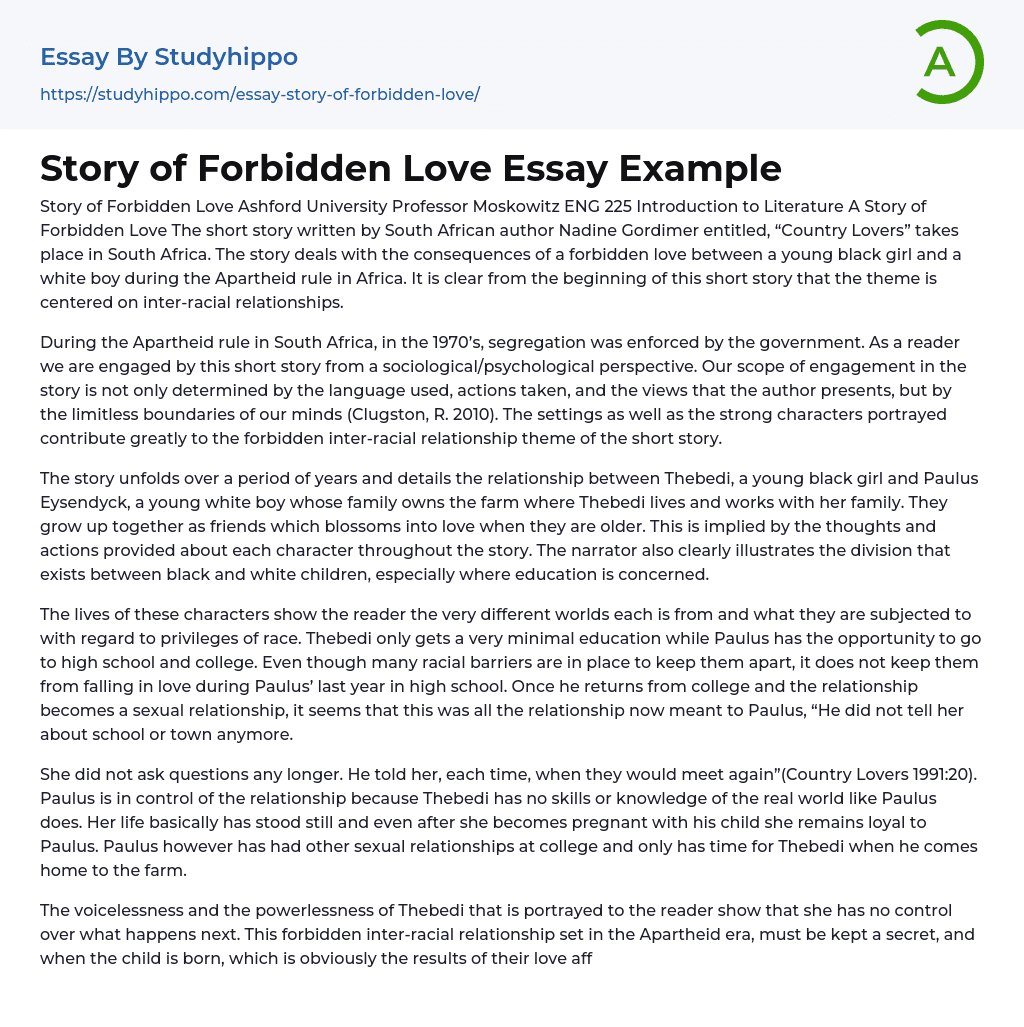The short story written by South African author Nadine Gordimer entitled, “Country Lovers” takes place in South Africa. The story deals with the consequences of a forbidden love between a young black girl and a white boy during the Apartheid rule in Africa. It is clear from the beginning of this short story that the theme is centered on inter-racial relationships.
During the Apartheid rule in South Africa, in the 1970’s, segregation was enforced by the government. As a reader we are engaged by this short story from a sociological/psychological perspective. Our scope of engagement in the story is not only determined by the language used, actions taken, and the views that the author presents, but by the limitless boundaries of our minds (Clugston, R. 2010). The settings as well as the strong characters portrayed contribute greatly to t
...he forbidden inter-racial relationship theme of the short story.
The story unfolds over a period of years and details the relationship between Thebedi, a young black girl and Paulus Eysendyck, a young white boy whose family owns the farm where Thebedi lives and works with her family. They grow up together as friends which blossoms into love when they are older. This is implied by the thoughts and actions provided about each character throughout the story. The narrator also clearly illustrates the division that exists between black and white children, especially where education is concerned.
The lives of these characters show the reader the very different worlds each is from and what they are subjected to with regard to privileges of race. Thebedi only gets a very minimal education while Paulus has the opportunity to go to high school an
college. Even though many racial barriers are in place to keep them apart, it does not keep them from falling in love during Paulus’ last year in high school. Once he returns from college and the relationship becomes a sexual relationship, it seems that this was all the relationship now meant to Paulus, “He did not tell her about school or town anymore.
She did not ask questions any longer. He told her, each time, when they would meet again”(Country Lovers 1991:20). Paulus is in control of the relationship because Thebedi has no skills or knowledge of the real world like Paulus does. Her life basically has stood still and even after she becomes pregnant with his child she remains loyal to Paulus. Paulus however has had other sexual relationships at college and only has time for Thebedi when he comes home to the farm.
The voicelessness and the powerlessness of Thebedi that is portrayed to the reader show that she has no control over what happens next. This forbidden inter-racial relationship set in the Apartheid era, must be kept a secret, and when the child is born, which is obviously the results of their love affair with one another, there is a new element of conflict that must be addressed. Paulus in a rage, kills the baby, but because he is an educated white male the government does not charge him with any crime, and states there is not enough evidence to charge him.
Thebedi is given very little opportunity to provide her side of the story during court. This clearly demonstrates, as does the relationship between Thebedi and Paulus, the dominance of whites over blacks in
South Africa in the setting of this story (Kgokong, A. 2009) The characters in “Country Lovers” and the setting of Apartheid in South Africa are used to show the fatality of racial segregation and the reasons why an inter-racial relationship cannot develop the same as a same-race relationship.
Unknown to Thebedi and Paulus as young friends, the love affair they would later develop was doomed before it ever began.
References
- Clugston, R. W. (2010). Journey Into Literature. San Diego, CA: Bridgepoint Education, Inc. (https://content. ashford. edu)
- Kgokong, M. A. (2009). Narrative Responses to Forms of Discrimination in South African Literature. Retrieved January 28, 2012 from: http://posthighdef21. wordpress. com/2009/04/24/narrative-responses-to-forms-of-discrimination-in-south-african-literature/
- Feminism essays
- Animal Rights essays
- Animal Testing essays
- Bullying essays
- Abortion essays
- Abuse essays
- Immigration essays
- Poverty essays
- Human Rights essays
- Inequality essays
- Violence essays
- Torture essays
- Crash essays
- Assault essays
- Racism essays
- Prejudice essays
- Controversial Issue essays
- Cyber Bullying essays
- Women's Suffrage essays
- Women'S Rights essays
- Women Empowerment essays
- Sojourner Truth essays
- Bullying In Schools essays
- Pro Choice essays
- Pro Life essays
- Should Abortion Be Legal essays
- Against abortion essays
- Abortion Debate essays
- Abuse Support essays
- Child Abuse essays
- Alcohol Abuse essays
- Physical Abuse essays
- Sexual Abuse essays
- Substance Abuse essays
- Migration essays
- Human Migration essays
- Illegal Immigration essays
- Immigrants essays
- Refugee essays
- Overpopulation essays
- Homelessness essays
- Hunger essays
- Dumpster Diving essays
- Homelessness In America essays
- Euthanasia essays
- Assisted Suicide essays
- Censorship essays
- Gun Control essays
- Empowerment essays
- Civil Rights essays




